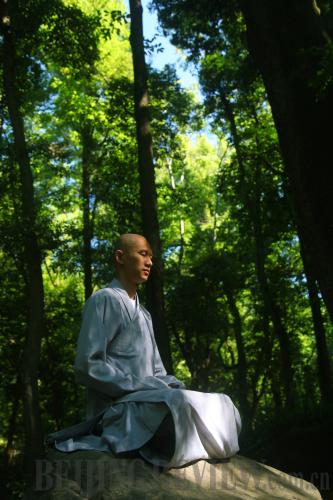|
 |
|
INNER PEACE: A monk practices meditation in the woods near a Buddhist temple in Anji, Zhejiang Province, on November 7, 2012 (CFP) |
The rapid pace of urbanization and industrialization is like a coin with two faces. On one side, Chinese are enjoying a more convenient, wealthier lifestyle; while on the other, people are stressed-out due to the challenges that come with modern society.
Increasingly tired of city life, more and more people desire a quiet place to understand the nature of life afresh. To Chinese, from time immemorial Buddhist monasteries have provided a space in which to break from the secular world. Nowadays, many such temples across China offer opportunities to experience the lifestyle of monks, whereby people learn classical philosophy, recite Buddhist scripture, meditate and follow a vegetarian diet.
On July 11, Lingyin Temple, one of China's most famous Buddhist monasteries, located in Hangzhou, east China's Zhejiang Province, recently launched its first Zen summer camp for university students. Zen, which means prolonged and intense contemplation, is an important aspect in understanding the doctrine of Buddhism.
According to monastery Master Zhizhong, the camp is aimed at teaching young undergraduates classical Buddhism pertaining to filial duties, gratitude and happiness alongside the theme of Harmonious Society and Wisdom.
The three-day event lasted from August 3 to 5. During this time, the monastery ran a number of classes focused on the rites of Buddhism, reciting scripture and physical work. As a free public event, both food and lodgings were provided to applicants.
"We hope young people can experience and better understand Buddhism through this training event," Zhizhong said.
"For a long time, Buddhism has been misunderstood by people as simply a collection of rites such as burning joss sticks and kowtowing in front of Buddhist statues, while it in fact enjoys deep cultural traditions and philosophy."
Zhizhong added that rapid economic development has boosted material interests, which have, along with the worship of money, negatively affected society, especially the youth. The summer camp aims to reinstate a spiritual outlook among the young people of today, he explained.
Lingyin Temple was first built in 328. As a historical vestige, it has accumulated a rich array of precious cultural relics spanning a period of over 1,000 years. Thanks to its high status among Buddhists in China, the temple is also an important research institution.
Strong demand
Similarly, the Cien Temple, located in Tiantai County of Zhejiang, on June 28 announced the launch of its own short-term religious experience. Subsequent applications have all but crashed the monastery's website. By early July, over 1,000 people had signed up, which meant the enrollment limit had to be pushed up.
This temple offers periodic meditation classes that range between three months, six months, one year and two years. Unlike real monks, participants are not completely isolated from the outside world, being able to use the Internet, computers, cell phones and other smart devices. What's more, the monastery also provides free board and lodging.
Master Zhidu, the abbot of the temple, said the monastery held these events since 2006 due to popular demand amongst believers.
"The Zen class aims to help participants develop a more positive attitude toward the nature of life."
However, because of the abundant number of applicants and limited resources, the temple has decided to postpone this year's event pending further notice.
| 